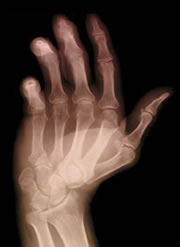Blocking protein in the human organism helps combat arthritis
Researchers have found out that knocking out one gene may help cure arthritis with mice

It is not ruled out that the promising method will in the future help cure arthritis with people suffering from the crippling disease. Osteoarthritis is the result of gradual destruction of the cartilage around joints (this cartilage softens friction between joints). The destruction in its turn entails pain, stiffness and other symptoms. 
More than a half of people over 65 years of age suffer from the disease. Unfortunately, there is no medication today to stop arthritis development, and patients are dependent upon painkillers and joints replacement only.
Two groups of researchers from the University of Melbourne, Australia, and Wyeth Research in Cambridge, Massachusetts have come up with an invention that may soon relieve millions of people of their pain. The researchers study a group of enzymes, the so-called aggrecanases that destroy the component making cartilage tough and elastic.
The researchers have found out that mice genetically modified to lack ADAMTS5, the functional form of one of these enzymes, are not subject to arthritis.
It is the first time that researchers have managed to indicate the protein driving joints decay. All previous protein studies brought no success; and this is the reason why the researchers are now laying so many hopes upon their new invention.
Main goal of the research is to develop drugs able to stop cartilage destruction. The researchers are making attempts to synthesize small molecules that interfere with the ADAMTS5 enzyme thus neutralizing it and prevent cartilage destruction.
The research is so much promising especially that the experimental mice lacking the working enzyme showed no problems elsewhere in their bodies that might be caused by the lack of the enzyme. This gives hope that drugs inhibiting the protein would have few side-effects that bring to nothing all previous therapy methods.
Even though blocking one protein may stop cartilage destruction, the researchers say there may be other substances besides the protein that trigger arthritis. It is known that the disease grows progressively worse with the age, in case of injuries, joint damages and excessive weight.
The research groups working on the problem generated arthritis with mice in two different ways. In one group, mice joints were purposefully damaged, and researchers in the other group stimulated arthritis artificially with inflammation. The second case resembles rheumatic arthritis more, as this disease breaks the immune system down and damages joints. However, even in this case blocking of ADAMTS5 successfully prevented cartilage decay.
This in its turn means that drugs blocking the enzyme under study may also help patients suffering from rheumatic arthritis.
Subscribe to Pravda.Ru Telegram channel, Facebook, RSS!


